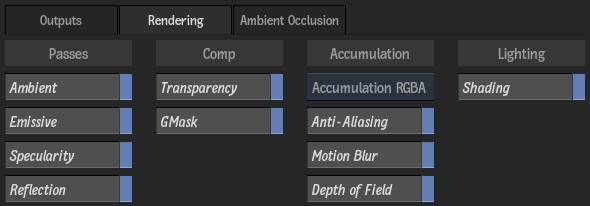Rendering Tab
Use the settings in the Rendering tab to further refine your output. These settings are applicable to all render passes of the same render layer.

- Ambient button
- Enable to process an output with the ambient effect.
- Emissive button
- Enable to process an output with the effect of an emissive map in the scene. An emissive map uses colours to simulate a glowing effect within the texture.
- Specularity button
- Enable to process an output with the specularity effect.
- Reflection button
- Enable to process an output with the reflection effect.
- Transparency button
- Enable to include the alpha transparency of the objects in the output.
- GMask button
- Enable to process the output with garbage mask effects.
- Accumulation box
- Select an accumulation processing option for the output (accumulation comprises AA, Motion Blur, DOF, and HWAA settings). You can select to apply accumulation to RGBA outputs only (Comp, Matte, Albedo, Emissive, Reflection, Shadows, and Specular), or to all outputs that support it. This setting also affects Camera FX rendering speeds.
- Anti-Aliasing button
- Select whether to apply anti-aliasing to the output (when the Accumulation box is set to On or RGBA).
- Motion Blur button
- Enable to include motion blur processing in the output.
- Depth of Field button
- Enable to process the selected output with the Depth of Field settings defined in the Action Setup menu.
- Shading button
- Enable to include shading effects for each output.
Ambient Occlusion Tab
Ambient occlusion refers to the blocking of indirect or diffuse light on an object. Ambient occlusion is caused by indirect light's inability to bounce around and illuminate areas that are blocked by a nearby object that absorbs the light rays. These subtle variations in lighting are visual clues for our eyes to detect surface details and distinctions that would otherwise be washed out and unnoticeable. Ambient occlusion adds realism to your scene by adding shadows in crevices, nooks and crannies, and so on. For each surface point, it calculates how much light is blocked by other geometry.

These settings are available for the AO type, and for the Comp type, if Ambient Occlusion is enabled in the Render Passes options.
- Density field
- Displays the amount of darker areas to include in the ambient occlusion output. Editable.
- Spread field
- Displays the width of the ambient occlusion effect. Editable.
- Falloff field
- Displays the amount of falloff around the edge of the ambient occlusion effect. Editable.
- Tolerance field
- Displays the starting point at which darker areas are included in the ambient occlusion output. Editable.
- Precision field
- Displays the number of steps to take into account on rays cast from the surface of the object. Editable.
- Blur field
- Displays the amount of blur applied to the ambient occlusion. Editable.
- Anti-Aliasing Samples box
- Select an ambient occlusion sampling level.
- Softness field
- Displays the softness value of the ambient occlusion sample. Editable.
- Regen button
- Enable to dynamically refresh the image as changes are made to the ambient occlusion settings.